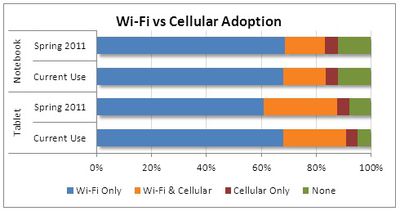Research firm NPD today announced the results of its latest survey of tablet and notebook usage trends, finding that the share of tablet users taking advantage of cellular connectivity for their devices has declined compared to earlier this year. According to NPD's numbers, 60% of users reported using their tablets on Wi-Fi only back in April, but that number has risen to 65% over the past six months.
“There are multiple reasons for greater Wi-Fi reliance,” said Eddie Hold, vice president, Connected Intelligence. “Concern over the high cost of cellular data plans is certainly an issue, but more consumers are finding that Wi-Fi is available in the majority of locations where they use their tablets, providing them ‘good enough’ connectivity. In addition, the vast majority of tablet users already own a smartphone, which fulfills the ‘must have’ connectivity need.”
There are also many more tablets hitting the market that do not provide cellular connectivity, such as the Kindle Fire. While many early adopters opted for tablets with embedded cellular – primarily as a “future proof” play – mainstream consumers are more likely to choose a lower price point and forgo the promise of constant connectivity.
Apple's iPad is the dominant product in the tablet market, and 3G-compatible models continue to carry a $130 premium over their Wi-Fi-only counterparts. While carriers have attempted to make data access for tablets flexible by offering as-needed access without the need for a data contract, cellular data service is still not a major add-on for most consumers. With the growing prevalence of Wi-Fi and features such as mobile hotspot functionality on smartphones, it is becoming less common for users to require on-board cellular data connectivity for their tablet devices.

One development that could increase cellular data usage is shared data plans, which could allow users to draw from a single allotment of data on multiple devices. Such plans could make it easier for tablet users to sign up for occasional data usage on their tablets drawn from their current smartphone data plans, without incurring a full month's data charge for the tablet alone.




















Top Rated Comments
When you sign up with a carrier, you should pay one fee for access to the network with whatever devices you like. It shouldn't matter. Why should it matter whether I connect to AT&T on an iPhone or an iPad? Why should it matter if I share my connection from my iPhone, to my iPad?? It's the same data. It's the same connection.
$30 a month to share your connection from your phone to your Mac or iPad? Or another $20 just to connect your 3G iPad to the same network as your phone? Of course nobody wants to pay for those ridiculous data plans the carriers offer.
I wonder if MyFi and other devices like those were included in the "wifi only" classification?
It wouldn't have surprised me if a big reason is because of the ridiculous 3G restrictions still in place on some apps!
So annoying watching poor quality Youtube videos, no streaming in certain apps, restricted functionality in certain apps, etc, just because it's over 3G.
Especially when that same 3G connection is used in the personal wifi hotspot devices and the iPad is then connected to "wifi" and those restrictions don't exist on that same connection as your buddy's 3G iPad!!!
Apple should make "My3G" part of iOS - give users the option to enable/disable 3G/Wifi detection in apps - I know my data limit, let us worry about that rather than babying everybody.
The 3G restrictions are the one thing that would push me to Wifi connectivity only on my iPad, but I hate the thought of having to carry something extra (3G wifi hotspot device) with me all the time (or at least whenever I think I'll need to get online...).
Anyway... rant over.
Thank god for My3G and jailbreaking.
That too! A friend of mine got mugged whilst walking the dog in a park, iPad in her bag. Wifi only so couldn't track it.
It's so annoying that technology is finally here to do so many amazing things remotely, and now people have to worry about caps on their phone, tablet, and home Internet connection (I'm talking to you Comcast, who keeps raising my Internet speeds and keeping my bandwidth cap the same)
Cloud computing is definitely on the rise but has the hurdle of the bandwidth cap to get over before it reaches it's true potential.
I use Netflix a lot, and other streaming services as well. I even tried onlive's cloud gaming platform. All of this is impressive technology, but now I'm literally counting bytes to make sure I don't get pounded by overages or removed from concast's service for going over 250gb in a month.
Bandwidth NEEDS to get cheaper somehow, because we are fast approaching a bottleneck.
On another note, public wifi is rarely faster than my ATT 3G, so screw that sentiment of "theres wifi everywhere anyway" because it sucks, lacks security, and is slow.
a) Smartphone/tablet users load up AT&T's cellular network
b) AT&T scrambles to block/cap/charge extra for data, and desperately encourages customers to use "free" and "fast" wi-fi hotspots
c) Smartphone/tablet users increasingly rely on wi-fi
d) AT&T whistles past their 3G graveyard
So AT&T wins by pulling the wi-fi quarter out of customers' ears, while pick-pocketing 3G.
The article might call AT&T's bluff by showing that poor AT&T, beat down by all those "gluttonous" mobile users, will do nothing to improve their 3G speed/quality/coverage/pricing even as users shift to wi-fi.
Feel free to replace "AT&T" with the wireless carrier of your choice.